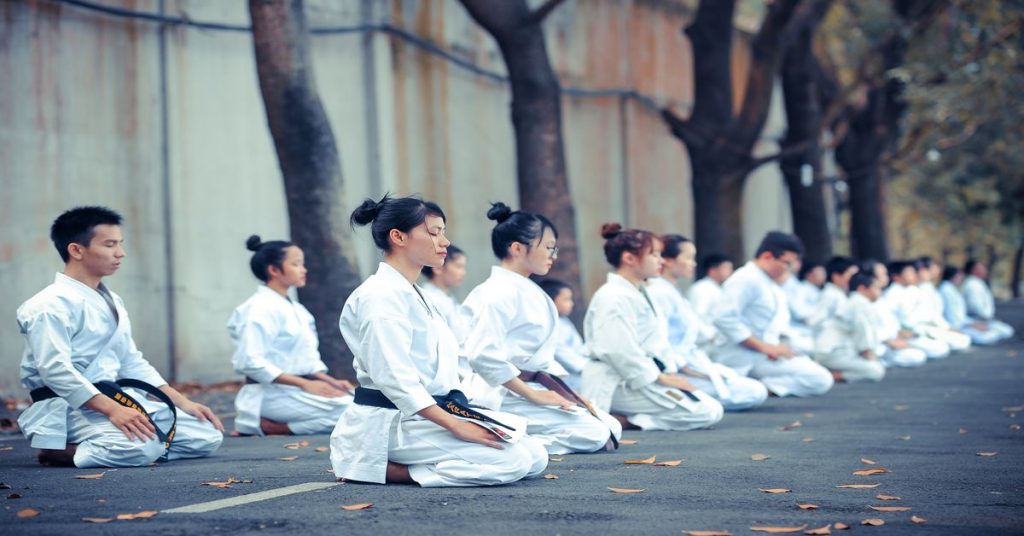In the Indian tradition, self-discipline is often seen as a means to overcome negative habits and tendencies, and to cultivate virtues such as compassion, kindness, and wisdom. It is also believed to be essential for the practice of yoga and meditation, as it helps to quiet the mind and bring about a sense of inner stillness and focus.
Self-discipline is seen as a key component of the path to self-realization and enlightenment in the Indian tradition. It is believed that through consistent and persistent practice, an individual can develop the self-discipline necessary to overcome the limitations of the ego and awaken to their true nature.
What Is Self-Discipline?
Self discipline is often referred to as “samyama” or “tapas.” It is seen as an important aspect of spiritual practice and self-development. Self-discipline in this context involves the cultivation of self-control and the ability to regulate one’s thoughts, emotions, and actions. It is believed that by practicing self discipline, an individual can develop greater inner strength and clarity of mind, and ultimately achieve a state of peace and contentment.
Self-discipline requires a strong sense of self-awareness, self-motivation, and self-control. It is an important quality to have, as it allows individuals to achieve their goals and make progress in their personal and professional lives. It can also help to improve decision-making skills and build self-confidence.
You will also ❤️ these:
7 Ways to Control Your Mind | Go From Distraction To Deep Work
10 Natural Ways To Improve Memory Power & Concentration
The Importance Of Self-Discipline
Self-discipline is seen as an essential quality to cultivate for personal and spiritual growth. It is believed to be a necessary foundation for the practice of yoga and meditation, as it helps to quiet the mind and bring about a sense of inner stillness and focus.
Self-discipline is also seen as a means to overcome negative habits and tendencies, and to cultivate virtues such as compassion, kindness, and wisdom. It is believed that by consistently practicing self discipline, an individual can develop greater inner strength and clarity of mind, and ultimately achieve a state of peace and contentment.
Self-discipline is also seen as important for spiritual growth and the attainment of enlightenment. It is believed that through consistent and persistent practice, an individual can develop the self discipline necessary to overcome the limitations of the ego and awaken to their true nature.
In addition to its spiritual benefits, self-discipline is also seen as important for practical and professional success. It allows individuals to set goals, prioritize tasks, and follow through on tasks, even when faced with challenges or distractions. It is an essential quality for achieving success in any area of life, and can help to improve decision-making skills and build self-confidence.
How To Be Disciplined For Good
Self-discipline is seen as an important aspect of spiritual practice and self-development. Here are some tips for cultivating self discipline in the Indian tradition:
Set clear goals: Identify what you want to achieve and create a plan for how to get there. Having a clear sense of purpose can help motivate you to stay disciplined.
Practice yoga and meditation: These practices can help cultivate self-control and bring about a sense of inner stillness and focus.
Cultivate positive habits: Identify negative habits or tendencies and work to replace them with positive ones. This might involve things like practicing kindness and compassion, or engaging in acts of service.
Practice self-inquiry: Reflect on your thoughts and actions and strive to cultivate a deeper understanding of your true nature.
Seek guidance: Seek out the guidance of a spiritual teacher or mentor who can help you on your journey of self-discovery and self discipline.
Be consistent: Practice self discipline consistently and make it a habit. The more you practice, the easier it will become.
Stay motivated: Find ways to stay motivated and keep yourself on track. This might involve setting small rewards for yourself, enlisting the help of an accountability partner, or finding ways to make the tasks you need to do more enjoyable.
Remember that developing self-discipline takes time and effort, but with practice and perseverance, it can become a natural part of your daily routine.
Self-Discipline Examples To Learn From
Here are some examples of self discipline:
Sticking to a healthy diet: This might involve planning meals in advance, avoiding tempting foods, and making an effort to eat a balanced diet.
Exercising regularly: This might involve setting a specific time each day for exercise, and sticking to it even when faced with other commitments or distractions.
Sticking to a budget: This might involve creating a budget, tracking expenses, and avoiding overspending.
Getting up early: This might involve setting an alarm and making an effort to get out of bed at a specific time each day, even if you don’t feel rested.
Sticking to a schedule: This might involve creating a schedule for each day and sticking to it, even when faced with unexpected events or distractions.
Completing tasks: This might involve setting goals and working hard to achieve them, even when faced with challenges or setbacks.
Remember that self-discipline involves consistently and persistently practicing control over one’s thoughts, emotions, and actions, even when faced with challenges or distractions. By looking to these examples and incorporating elements of self discipline into your own life, you can begin to cultivate this important quality.
Knowing How To Build Self-Discipline Takes Work But Can Be Done
Self discipline is a valuable quality that can help individuals achieve their goals and make progress in their personal and professional lives. It involves setting goals, prioritizing tasks, and following through on tasks, even when faced with challenges or distractions. While it can be difficult to develop self-discipline, it is a skill that can be learned and improved upon with practice and persistence.
To build self discipline, it is helpful to set clear goals, create a schedule, get organized, minimize distractions, take breaks, be consistent, stay motivated, and practice mindfulness. In the Indian knowledge system, self discipline is also seen as an important aspect of spiritual practice and self-development, and can be cultivated through practices such as yoga and meditation, engaging in acts of service, and reflecting on one’s own thoughts and actions.
Remember that building self discipline takes time and effort, but it is a skill that is well worth developing. With practice and perseverance, you can learn to control your thoughts, emotions, and actions, and achieve your goals.
Download the Paavan App for more such lifestyle related solutions.
Frequently Asked Questions
Question 1. What is self discipline?
Self-discipline is the ability to control one’s own behavior and actions, especially in pursuit of a goal or commitment. It involves setting goals, prioritizing tasks, and following through on tasks, even when faced with challenges or distractions.
Question 2. Why is self discipline important?
Self-discipline is an important quality to have, as it allows individuals to achieve their goals and make progress in their personal and professional lives. It can also help to improve decision-making skills and build self-confidence.
Question 3. How can I improve my self discipline?
To improve self-discipline, try setting clear goals, making a schedule, getting organized, minimizing distractions, taking breaks, being consistent, staying motivated, and practicing mindfulness.
Question 4. Is self discipline the same as self-control?
Self-discipline and self-control are closely related, as they both involve the ability to regulate one’s thoughts, emotions, and actions. However, self discipline typically involves setting goals and working towards them over time, while self-control is more focused on the ability to resist temptation or control impulses in the moment.
Question 5. Can self discipline be learned?
Yes, self-discipline is a skill that can be learned and improved upon with practice and persistence. It is not something that people are born with, but rather something that is developed over time through consistent effort and practice.






